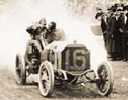Champ Car Is Not F1 Ö Nor Should It Be
By
8/29/04
With the current technical regulations badly needing an overhaul, there has been a lot of talk lately about what the next generation Champ Car should be. Along with all that talk, there has been a lot of silly suggestions as well.
First, letís see what made Champ Car great, at least during the CART era, by looking at the peak of the series Ė the early to mid 90s. During that time period, competition was intense, passing prevalent, and variety was the spice of the series.
CART was not an oval based series, it was not F1, it was not a spec series, and it raced primarily in the USA. In a nutshell, it was a product that nobody else had, requiring a driver to be more versatile than any other series demanded. It needs to once again be a unique product in the crowded motorsports marketplace.
You cannot achieve that by being a second rate F1 series, like some folks are proposing. You cannot achieve that by dumping all the ovals. You cannot achieve that by racing the majority of the time overseas.
At one time the schedule consisted of a nice mix of short ovals, superspeedways, road courses, and street circuits. I always believed the perfect schedule would be split 25% for each of those type of tracks. Nowadays, for reasons most people are familiar with, thatís not a possibility. However, that does not mean the tradition of ovals should be abandoned all together.
True, open wheel oval racing has had its problems in recent years thanks to NASCARís monopolization. However, there are pockets of success. The IRL has drawn very well at Texas and sometimes on tracks that do not host a Nextel Cup event. Champ Car has drawn well with overseas oval races, Fontana still drew well even when attendance dipped, and Las Vegas just may be a success after all. By carefully selecting and nurturing specific oval races, Champ Car can successfully keep that form of racing on their schedule.
Some may say that with the IRL picking up road races, why would Champ Car not want to differentiate themselves from what the IRL is becoming. Letís look at it the other way around. Perhaps, the IRL is picking up road races because they know what was successful before Ė ovals and road courses. Why would Champ Car allow the IRL to go unchallenged with a schedule that worked before by abandoning oval races?
(Please don't tell me that oval racing is easy. Sure Europeans and Brazilians do sometimes pick up the art of oval racing very quickly, but that is more due to their experience with rear engine open wheel cars, not that it is easy. Only people who have never driven race cars, much less on ovals, think they are a piece of cake. If you create a spec where cars have to be driven on an oval, they are just as much a test of talent as other disciplines of the sport.)
There are some who are concerned that if ovals are kept, then the cars will have to remain heavy and bulky, thus making them appear slow and boring on road/street courses compared to F1.
Folks, letís face a reality as sure as taxes and death Ė Champ Cars will never perform as well as an F1 car on a road/street circuit. Never. Besides, does it really matter? This weekend in Montreal, on the exact same track F1 used two months earlier, 100,000 fans didnít seem to give a damn that the Champ Cars are a few seconds slower than F1. So, the only question is how much do you want to compromise?
With todayís technology and safety improvements, you can still shed a few hundred pounds off the car while keeping it safe for oval racing, while at the same time using some of the new technology to make the cars handle better and be more nimble.
As for horsepower, the key of course is the engine package. Ultimately, you must go with the desires of the engine manufacturers who are willing to support the series. However, Champ Car must be careful of two things.
They must be careful if they wish to drop the turbocharger. Whether the turbo is traditional or not, isnít the point. Most of todayís fans identify the turbo with Champ Cars, and that is the point. Also, with all the street races on the schedule, turbocharged engines tend to be quieter and thus will cause less problems with the local population.
Plus, horsepower on a turbo engine can easily be kept in check with the popoff valve, instead of a horrid rev limiter on normally aspirated engines. So, if the turbo has to be dropped, it must be for a very, very, very good business reason. Not just because someone keeps "screaming" over and over again.
The other powerplant item Champ Car must be careful of is to make sure the engine does not seem like an F1 hand me down. True, I said earlier that folks should not be too concerned with lesser performance than an F1 car, but that doesnít mean one should be so obvious about it. The engine has to be unique in some way from F1, even if it does rely a lot on F1 specs to keep the manufacturers costs down and participation up.
Finally, thereís the schedule. Racing overseas is important and smart. Within reason. The series must still have the majority of the races in the USA Ė okay, North America Ė or it will lose even more of its support. Why? Simple.
There may be a valid market for Champ Car overseas, but no matter how successful they are filling the holes of F1, it will never top F1. So, by default, it becomes a second rate series to F1, and then it gets lost amongst all the other European open wheel series such as F3000, A1 GP, World Series by Nissan, and so on.
Essentially, Champ Car would be making the same mistake the IRL is making. The IRL is trying to be the open wheel version of NASCAR. Itís failing miserably. Champ Car cannot try to be the American open wheel version of F1 in Europe, or it too will fail miserably. And in doing so, Champ Car would lose the support of the American fan who would follow a European Champ Car series as much as they follow F1 Ė not at all.
Champ Car has never been and is currently not F1. Nor should it be if it ever hopes to return to its former prominence as a unique, and popular, niche in the motorsports field.
Copyright © 2004 by Russell Jaslow and Deep Throttle. All Rights Reserved.
| 



